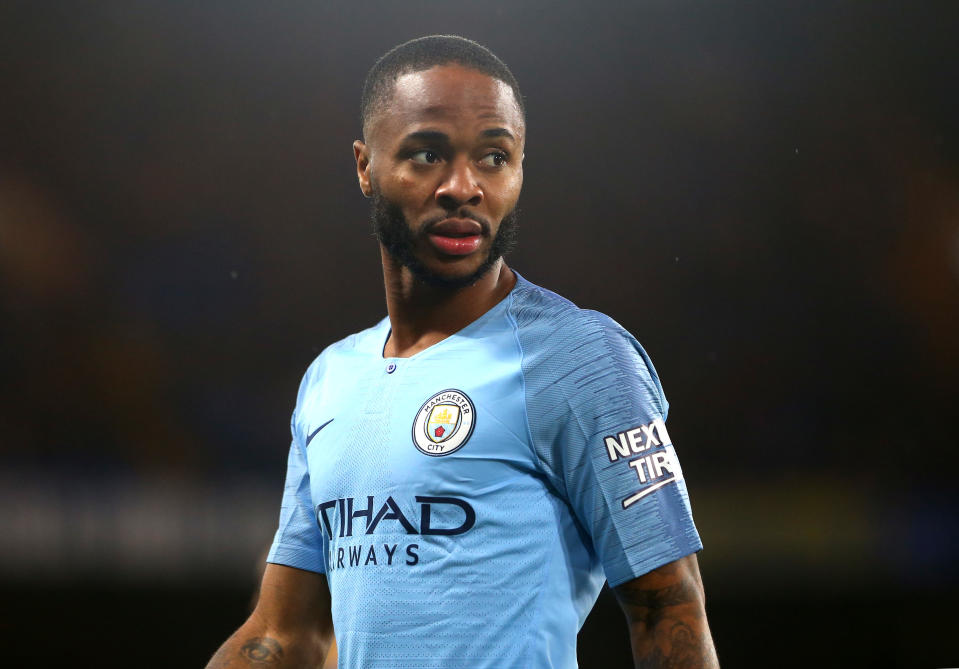Raheem Sterling's treatment by Chelsea fans shows racism is still prevalent in soccer, and it's past time for that to change
Stop me if you’ve heard this one before, but there’s been a high-profile racist incident in soccer.
During Manchester City’s 2-0 loss at Chelsea on Saturday, its first defeat of the Premier League season, Raheem Sterling ambled off the field to grab a ball that had gone out of bounds. That’s when a handful of Chelsea fans, sitting within feet of the playing surface, as in most all English stadiums, gave him an earful of verbal abuse.
A video quickly did the rounds. One of the men was apparently hurling racist language at the black, 24-year-old winger.
It came less than a week after a Tottenham Hotspur fan threw a banana skin at Arsenal’s black striker Pierre-Emerick Aubameyang.
And those incidents hardly stand alone. Just a year ago, Sterling was physically attacked and racially abused by a stranger outside of City’s practice facility, who was sentenced to four months in jail. Racist abuse is almost quotidian in English soccer. In global soccer, really. It’s a deep stain on the game that remains impossible to wash out.
Sterling has understandably grown cynical about it all. “Regarding what was said at the Chelsea game as you can see by my reaction I just had to laugh because I don’t expect no better,” he wrote on Instagram. He then pointed out the British tabloids’ habitual coverage of young black players as overpaid and living overly lavish lifestyles. Which, well, he’s absolutely right about.
Papers like the Daily Mail do seem to stoke a kind of racist populism when they call out black players’ habits of spending money they’ve earned and shouldn’t have to answer to anyone for. As Sterling puts it, the Mail will criticize a young black player for buying a house and praise a young white one for doing the exact same thing. In the case he highlighted on Instagram, both players bought houses for their mothers for roughly the same amount. One was deemed a spendthrift; the other the saintly son. One guess which was which.
The sordid episode at Stamford Bridge has reawakened a debate that’s never dormant for very long: How to handle racism in soccer. How to handle racism more broadly in England, a country with a large population of black citizens who migrated from all over the British Empire. And the effectiveness of the long-running but shamefully underfunded “Kick It Out” anti-racism campaign in soccer has been called into question. On Monday, the debate raged just as England was trying to work out if Brexit was still happening – which is sort of ironic, but we’ll get to that later.

Meanwhile, the sport’s elite have been criticized for being slow and negligent in acting.
But by and large, everybody was quite pleased with the response. The fans in question were roundly and swiftly condemned. Sterling’s response was praised. Chelsea banned all four of the fans who hurled abuse at Sterling. Police is investigating.
It’s just that it keeps on happening. As black former England player Stan Collymore wrote for the Guardian, “Raheem Sterling has got everyone talking about racism. Racism in football, racism in the media, racism in society as a whole and from certain high-up quarters the response has been to show sympathy and support for Sterling and call for change.”
“But here’s the thing: nothing will change,” Collymore continued. “It never does when it comes to racism in this country.”
No matter how glitzy soccer becomes, no matter how highly paid and famous its many non-white stars get, this seething undercurrent of racial resentment somehow remains. Grows stronger, perhaps. Collymore points to the Brexit climate of xenophobia and other assorted household bigotry as an exacerbating factor. And that’s possibly true in much of the West, where right-wing politics have enjoyed a years-long resurgence.
So now what?
How to root out the racism that’s as old as the sport itself?
There’s no sense in overanalyzing the abuse itself, just as there’s little point in praising the response. Whether it’s outright racism or a vessel for the game’s deep-rooted tribalism is beside the point. Racism is racism.
There needs, first and foremost, to be a recognition at the very highest levels of the game – almost entirely the province of white men – that the issue persists. FIFA’s long-time president and moral abomination Sepp Blatter once declared that if a player had been racially abused by an opponent during a game, they should nevertheless shake hands afterward.
His successor isn’t much better. On Gianni Infantino’s watch, FIFA disbanded its anti-racism task force two years ago, declaring with a straight face that its mission of ridding soccer of racism was “completely fulfilled.”
LOL.
A solution isn’t yet in sight. It keeps happening. And soccer hasn’t yet demonstrated that it’s capable of addressing its own worst habits. Because, like it or not, racism is as much a part of soccer as the shinguard or the corner kick.
Leander Schaerlaeckens is a Yahoo Sports soccer columnist and a sports communication lecturer at Marist College. Follow him on Twitter @LeanderAlphabet.
More from Yahoo Sports:
• Fired Packers coach makes puzzling Rodgers comment
• RB Bell celebrates Steelers’ shocking loss to Raiders
• Was this key play in ‘MNF’ game actually illegal?
• Emotional final meeting for Wade and LeBron


